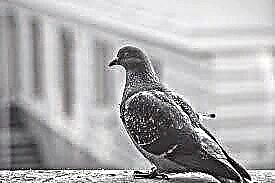The lucky, hospitable, generous to the poor ruler of the Amir tribe lives in Arabia. He is “glorious, like a caliph,” but like a “candle without light,” for he has no posterity. Finally, Allah heeded his prayers and bestowed upon his beautiful son. The infant is entrusted to the nurse, and time pours “tenderness milk” into the growing child. Case - the name of the boy, which means in Arabic "Merit Talent", excels in learning. Several girls study with the boys. One of them became famous early on with its mind, spiritual purity, and rare beauty. Her locks are like night, and her name is Leili (“Night”). Case, "having stolen her heart, destroyed his soul." The love of children is mutual. Fellow practitioners learn arithmetic, lovers meanwhile compose a dictionary of love. Love cannot be hidden. Case is exhausted from love, and those who did not stumble on her road called him Majnun - “Madman”. Fearing gossip, relatives hid Leyli from Majnun. Sobbing, he wanders the streets and the bazaar. Wall, sings the songs composed by him. And after him everyone shouts: “Madman! Madman! ” In the morning, Majnun leaves for the desert, and at night secretly makes his way to the house of his beloved to kiss the locked door. Once with several loyal friends, Majnun comes to the tent of his beloved. Layley takes off the cover, revealing her face. Majnun complains about her evil fate. Fearing the rivals' intrigues, they look at each other alienated and do not know that rock will soon deprive them of even this single look.
After consulting with the elders of the tribe, Majnun’s father decided to “buy out the jewelry of foreigners at the cost of hundreds of jewelry”. At the head of a magnificent caravan, he solemnly goes to the Leili tribe - to woo the beauty for his son. But Leili's father rejects the matchmaking: Case is noble by birth, but insane, marriage to a madman does not bode well. Relatives and friends exhort Majnun, offer him hundreds of beautiful and rich brides in return for Leyli. But Majnun throws his own home and in rags with a cry of “Leili! Layley! " running through the streets, wandering in the mountains and in the sands of the desert. Saving the son, the father takes him with him to the Hajj, hoping that the worship of the Kaaba will help in trouble, however, Majnun does not pray for his healing, but only for the happiness of Leili. His illness is incurable.
The Leyli tribe, indignant at the gossip of the nomads, with “gravel,” from which the beauty “seemed to be in the heat”, became hardened. The military leader of the tribe draws a sword. Death threatens Majnun. Father is looking for him in the desert to save, and finds in some ruins - a patient, possessed by an evil spirit. He takes Majnun home, but the madman escapes, rushing only to the coveted Nedzhd, the homeland of Leili, On the way he composes new gazelles.
Meanwhile, Layley is in despair. Unnoticed by pets, she climbs the roof of the house and stares at the road all day, hoping that Majnun will come. Passers-by greet her with verses of her beloved. She replies to poetry in verse, as if "jasmine sends the message to cypress." Once, while walking in a flowering garden, Leyli hears someone's voice singing a new gazelle: "Majnun is suffering, and Leyli ... What spring garden does she walk in?" A friend, shocked by Leily's sobs, tells her mother everything. Trying to save her daughter, Leili's parents benevolently accept the matchmaking of a wealthy young man, Ibn-Salam.
The mighty Naufal found out about the sorrows of Majnun and was filled with compassion for him. He invited the unfortunate wanderer to him, caressed, offered help. Majnun promises to pull himself together and wait patiently. He is cheerful, drinks wine with a new friend, and is known as the wisest in the congregation of sages. But days are running out, patience is running out, and Majnun tells Naufal that if he does not see Leili, then he will part with life. Then Naufal leads a select army into the battle and demands Leyli from her tribe, but he failed to win the bloody battle. Unable to hear the lamentations of the fallen Majnun, Naufal reassembles his army and finally wins. However, even now, Leili’s father is ready to prefer even his slavery and the death of his daughter to her crazy marriage. And Naufal’s associates are forced to agree with the old man. Naufal withdraws his army in sorrow. Lost hope Majnun disappears. He wanders for a long time in the sands of the desert, finally gets to a poor old woman who leads him on a rope and collects alms. In a state of complete madness, Majnun gets to Leyli's homeland. Here the relatives found him and, to their great despair, became convinced that he “forgot both the dwellings and the ruins”, everything was erased in his memory, except for the name Leili.
With a huge ransom, with rare gifts from Byzantium, China and Taif, the messenger of Ibn Salaam is to the father of Leili. They played a wedding, and Ibn-Salam took Leyli to his house. But when the lucky man tried to touch the newlywed, he received a slap in the face. Layley is ready to kill her unloved husband and die. Loving Ibn-Salam agrees to limit himself to "seeing her." Majnun learns about Leili's marriage, the messenger also tells him about Leili's sadness and chastity. Majnun is in dismay. The unfortunate father wants to find a cure that would heal his son. Peering into the face of an old man who came to him, Majnun does not recognize his father. After all, one who has forgotten himself cannot remember others. The father calls himself, cries with his son and calls him for courage and prudence, but Majnun does not heed him. A desperate father sadly says goodbye to a doomed madman. Soon Majnun learns about the death of his father from an oncoming person, who reminded that "besides Leili, there are relatives." Day and night Majnun cries at the grave and asks for forgiveness from the "star that gave the light." From now on, wild beasts of the desert became his friends. Like a shepherd with a herd, Majnun walks in a crowd of predators and shares the offerings of the curious with them. He sends his prayers to heaven, to the chamber of the Most High, prays to the stars. Suddenly he receives a letter from Leili. The beauty handed her message to the messenger with bitter words: "I am crazier than a thousand Majnuns." Majnun reads a message in which Leyli talks about his pity for a friend of the children's games, who is tormented by her, assures her of loyalty, chastity, mourns Majnun's father, as if he were his, calls for patience. Leili writes: “Don’t be sad that you have no friends, am I not your friend?” In a hurry, Majnun writes a reply letter. Leyli looked at the message of Majnun and irrigated him with tears. The letter is crowded with words of love and impatience, reproaches and envy for the lucky Ibn-Salam, who at least sees the face of Leyli. "The balm will not heal my wounds," writes Majnun, "but if you are healthy, there is no sadness."
Majnuna in the desert is visited by his uncle Selim Amirit. Fearing the animals surrounding the nephew, he greets him from afar. He brought Majnun clothes and food, but also halva and cookies go to the beasts. Majnun himself eats only herbs. Selim seeks to please Majnun, tells a parable in which the same hermit is praised. Overjoyed by understanding, Majnun asks to tell about the affairs of friends, asks about his mother’s health: “How does that bird with broken wings live? .. I crave to see her noble face.” Feeling that a voluntary exile loves his mother, Selim brings her to Majnun. But the tearful complaints of the mother, who bandaged the wounds of her son and washed his head, are powerless. “Leave me with my sorrows!” - exclaims Majnun and, having fallen, kisses the dust at the feet of his mother. With crying mother returned home and said goodbye to the mortal world. This sad news is brought to him by the afflicted Selim. Majnun sobbed like the strings of a chang, and fell to the ground like glass on a stone. He cries at the graves of his parents, relatives bring him to his senses, try to detain him in his native land, but Majnun with groans escapes into the mountains. Life, even if it lasted a thousand years, seems to him an instant, because "its basis is death."
Like a snake tail, a string of disasters reaches for Leily. The husband guards her and mourns his fate. She tries to caress Leili, to please her, but she is stern and cold. An old man who has come to the house tells about the fate of someone who “screams like a herald and wanders through oases”, invoking his beloved. Leilly's cypress mill from her sobs became a “reed”. Having given her pearl earrings to the old man, she sends him for Majnun.
The wanderer lies at the foot of the mountain, he was surrounded by animals, guarding, like a treasure. Seeing the old man from afar, Majnun rushed to him, "like a child to milk." Finally, he was promised a date in a palm grove. “How can a thirsty man run away from the Euphrates? How can the wind fight ambergris? ” Majnun sits under a palm tree in a designated place and waits for Leyli. Layley, accompanied by an old man, goes, but stops ten steps from her beloved. She does not love her husband, but is incapable of treason. Asks Majnun to read poetry, Majnun sings for Leyli. He sings that she seems to him a mirage, a spring that only dreams of a traveler tormented by thirst. There is no longer any faith in earthly happiness ... Again, Majnun rushes into the desert, and the gloomy Leyli returns to his tent. The noble young man Salam of Baghdad heard the songs of unhappy love of Majnun. Salam finds Majnun and offers him his ministry. He longs to hear the songs of Majnun and asks to consider himself one of the tamed beasts. Gently greeting Salam, Majnun tries to reason with him. Tired of himself, he will not get along with anyone except animals. Salaam prays not to reject his help. Majnun condescends to pleas, but is not able to accept a delicious treat. Salaam is comforted by Majnun. After all, he himself experienced a similar feeling, but burned out; "When youth passes, the fiery furnace cools down." Majnun in response calls himself the king of kings of love. Love is the meaning of his whole life, it is irreplaceable, The interlocutor is silently ashamed. For several days, new friends wander together, but Salam cannot live without sleep and bread, and now he says goodbye to Majnun, goes to Baghdad, "having loaded the memory with many kassids."
Layley is like a treasure that guards a serpent. She pretended to have fun with Ibn-Salam, but she weeps alone and, exhausted, falls to the ground.
Ibn Salam fell ill. The healer restored his strength, but Ibn-Salam does not listen to the advice of the healer. The body, exhausted by "the first disease, the second disease passed to the wind." The soul of Ibn Salam "got rid of worldly torment."
The saddened Leili mourns him, although she has found the desired freedom. But, grieving for the departed, in her soul she remembers her beloved. According to the custom of the Arabs, Leili was left alone in her tent, because now she has to sit at home for two years, not showing her face to anyone. She got rid of the annoying visitors, and, alas, now she has a legitimate reason for sobbing. But Leyli mourns another grief - separation from her beloved. She prays: “Lord, connect me with my lamp, from the fire of suffering of which I burn!”
In the days of leaf fall, bloody drops flow from the leaves, the “face of the garden” turns yellow. Layley got sick. As if from a high throne fell "into the well of ailment." Alone, she "swallowed grief" and is now ready to part with her soul. Leyli knows one thing: Majnun will come to her grave. Saying goodbye to the mother, the dying leaves Majnun in her care.
Majnun’s tears over Leyli’s grave are inexhaustible, as if rain poured from dark clouds. He whirls in a crazy dance and composes verses about eternal separation, But “soon, soon, soon” Allah will connect him with the departed. Only two or three days Majnun lived so that "death is better than that life." He is dying, hugging the grave of his beloved. His decayed bones are guarded by faithful wolves for a long time, the Tribe of Majnun learns of his death. Having mourned the sufferers, the Arabs bury him next to Leili and break the flower garden around the graves. Lovers come here, the afflicted are healed of ailments and sorrows.


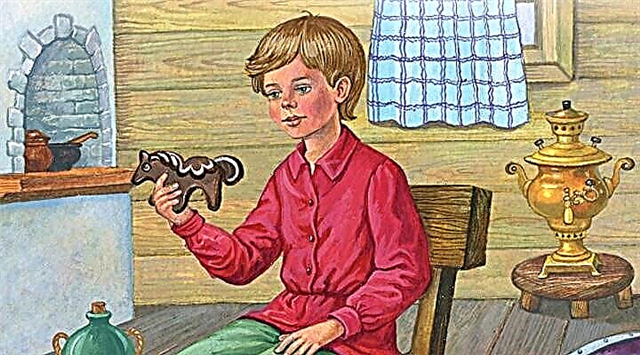
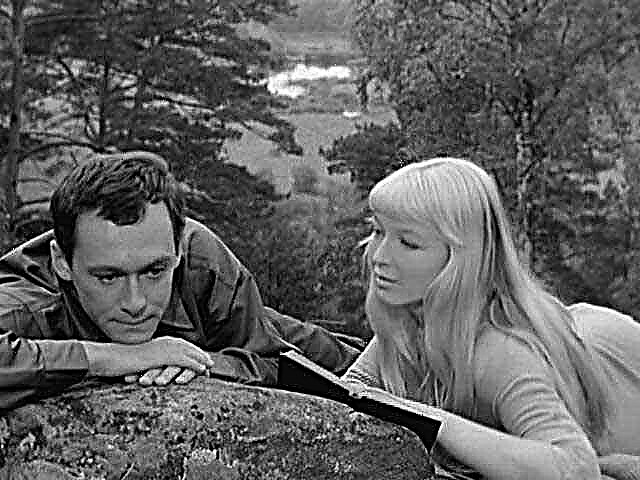
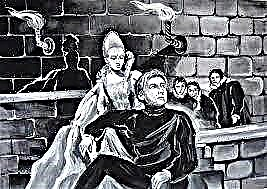

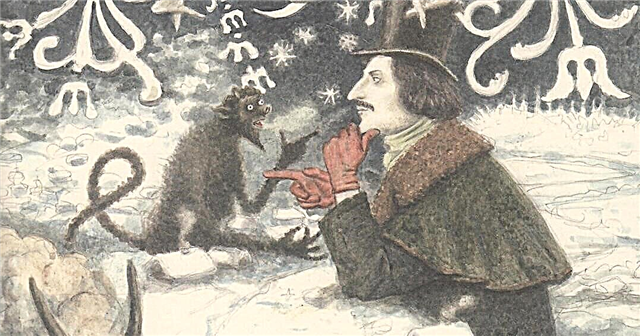 Evenings on a Farm Near Dikanka
Evenings on a Farm Near Dikanka
